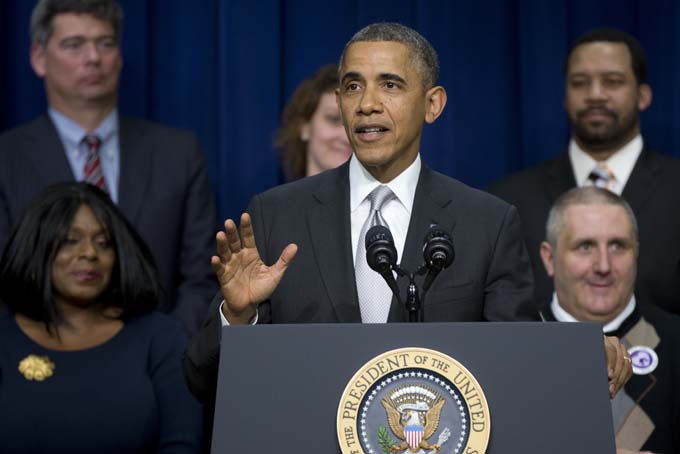
WASHINGTON (AP) — His health care plan facing a dicey transition, President Barack Obama said Friday that insurance sign-ups are surging now that the government’s website is working better for consumers. But it was too soon to say the rollout has turned the corner.
More than 1 million people have enrolled since Oct. 1, Obama said at his end-of-the-year press conference. That’s more than two-and-a-half times the number on Nov. 30, when major fixes to the website were completed. At that point, only 365,000 had signed up through new federal and state markets offering subsidized private insurance.
“That is a big deal,” Obama said of getting coverage for uninsured people. “That’s why I ran for this office.”
Separately, officials said 3.9 million people have qualified for government health care through the law’s Medicaid expansion. Even so, things aren’t exactly humming along.
HealthCare.gov was down for part of the day Friday, as technicians attempted to fix an error that occurred Thursday night when the site was undergoing routine maintenance, officials explained.
The administration cannot afford for the balky website to crash this weekend. Because of Monday’s deadline to sign up so coverage can take effect Jan. 1, unusually heavy traffic is expected on the federal site and those run by states.
Largely hidden from consumers, another set of technical problems is frustrating insurers, who say the government continues to send them inaccurate data on some enrolled individuals. Insurers call some of those jumbled enrollment files “orphans” and others “ghosts.”
They could turn into gremlins after Jan. 1 for some patients trying to use their new coverage. Consumers might show up at the pharmacy counter or doctor’s office only to be told they’re not in the system.
That’s not the only potential issue. Administration officials are scrambling to prevent breaks in coverage among more than 4 million people whose individual policies were cancelled this fall because they did not meet the law’s requirements. An estimated 500,000 have yet to secure new coverage. On Thursday, the administration said those individuals would not be penalized for remaining uninsured, and that they could also have access to special bare-bones catastrophic insurance plans.
The president minimized the significance of that accommodation Friday, calling it a net to catch a small number of people who may slip through the cracks.
Still tinkering with the website, the administration now faces crucial deadlines within a two-week stretch.
The last day to sign up for coverage to take effect with the new year is Monday. And Jan. 1 is the day the people can start using their new policies. Starting then, the law forbids insurers from turning away people with pre-existing medical conditions. The law’s mandate that virtually all Americans carry coverage also goes into place, although uninsured people can avoid a tax penalty if they pick a plan by Mar. 31.
The stakes are much higher now than Oct. 1, when HealthCare.gov went live. It’s not just that the president’s political reputation has been tarnished by website woes and insurance cancellations.
The risk now is that ordinary people with pressing medical needs will suffer harm if the transition to coverage is fumbled. If that happens, Health and Human Services Secretary Kathleen Sebelius will face a new round of demands for her resignation.
“Implementing the website is the relatively easy part,” said Mark McClellan, who oversaw the problematic rollout of the Medicare prescription drug benefit for President George W. Bush. “Implementing the coverage itself involves a lot more things that could go wrong, and there’s a lot more at stake.
“It was possible for people to wait a month or two to use the website,” McClellan added. “People who need care on Jan. 1 are not going to be able to wait a month or two to get it.” McClellan is now a health policy expert with the nonpartisan Brookings Institution, a Washington think-tank.
Obama was feeling optimistic Friday. In first three weeks of December, more than 500,000 people signed up through the federal website, he noted. On Oct. 1, only a handful managed to enroll successfully.
Crossing the 1 million mark was a milestone, but the administration’s own estimates called for 3.3 million to enroll by Dec. 31. The target now is 7 million by the end of open enrollment on Mar. 31.
In Florida on Friday, Lisa Hulsey wasn’t feeling very confident. She had waited nearly an hour to sign up for health insurance with a counselor because the website was down. The couple before Hulsey zipped through in less than an hour and chose a midrange silver plan.
Hulsey, a paralegal, had employer insurance at no cost to her. But her company is no longer offering coverage, instead pushing employees into the federal marketplace where they may qualify for subsidies.
“I’m hungry. I’m frustrated. It should work,” said Hulsey. She was leaving this weekend to visit her family in Alabama and did not know when she would have time to try again before Monday’s deadline.
___
Associated Press writer Kelli Kennedy in Miami contributed to this report.